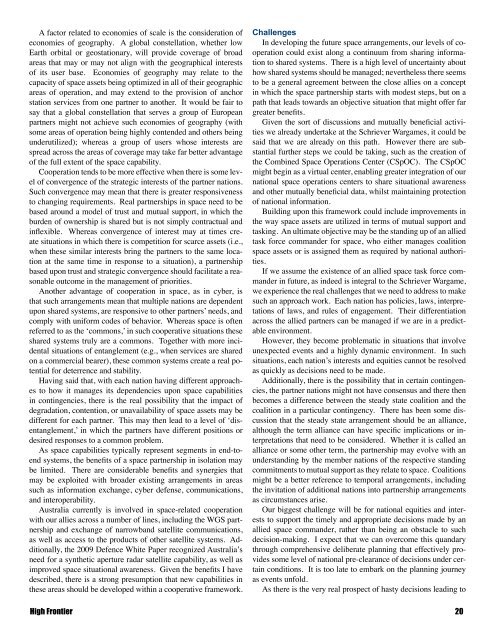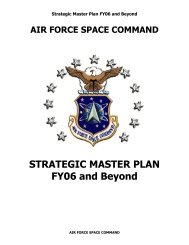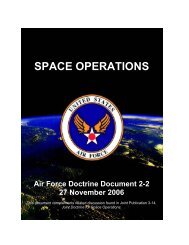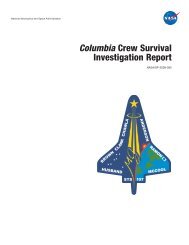Schriever Wargame 2010 - Air Force Space Command
Schriever Wargame 2010 - Air Force Space Command
Schriever Wargame 2010 - Air Force Space Command
You also want an ePaper? Increase the reach of your titles
YUMPU automatically turns print PDFs into web optimized ePapers that Google loves.
A factor related to economies of scale is the consideration of<br />
economies of geography. A global constellation, whether low<br />
Earth orbital or geostationary, will provide coverage of broad<br />
areas that may or may not align with the geographical interests<br />
of its user base. Economies of geography may relate to the<br />
capacity of space assets being optimized in all of their geographic<br />
areas of operation, and may extend to the provision of anchor<br />
station services from one partner to another. It would be fair to<br />
say that a global constellation that serves a group of European<br />
partners might not achieve such economies of geography (with<br />
some areas of operation being highly contended and others being<br />
underutilized); whereas a group of users whose interests are<br />
spread across the areas of coverage may take far better advantage<br />
of the full extent of the space capability.<br />
Cooperation tends to be more effective when there is some level<br />
of convergence of the strategic interests of the partner nations.<br />
Such convergence may mean that there is greater responsiveness<br />
to changing requirements. Real partnerships in space need to be<br />
based around a model of trust and mutual support, in which the<br />
burden of ownership is shared but is not simply contractual and<br />
inflexible. Whereas convergence of interest may at times create<br />
situations in which there is competition for scarce assets (i.e.,<br />
when these similar interests bring the partners to the same location<br />
at the same time in response to a situation), a partnership<br />
based upon trust and strategic convergence should facilitate a reasonable<br />
outcome in the management of priorities.<br />
Another advantage of cooperation in space, as in cyber, is<br />
that such arrangements mean that multiple nations are dependent<br />
upon shared systems, are responsive to other partners’ needs, and<br />
comply with uniform codes of behavior. Whereas space is often<br />
referred to as the ‘commons,’ in such cooperative situations these<br />
shared systems truly are a commons. Together with more incidental<br />
situations of entanglement (e.g., when services are shared<br />
on a commercial bearer), these common systems create a real potential<br />
for deterrence and stability.<br />
Having said that, with each nation having different approaches<br />
to how it manages its dependencies upon space capabilities<br />
in contingencies, there is the real possibility that the impact of<br />
degradation, contention, or unavailability of space assets may be<br />
different for each partner. This may then lead to a level of ‘disentanglement,’<br />
in which the partners have different positions or<br />
desired responses to a common problem.<br />
As space capabilities typically represent segments in end-toend<br />
systems, the benefits of a space partnership in isolation may<br />
be limited. There are considerable benefits and synergies that<br />
may be exploited with broader existing arrangements in areas<br />
such as information exchange, cyber defense, communications,<br />
and interoperability.<br />
Australia currently is involved in space-related cooperation<br />
with our allies across a number of lines, including the WGS partnership<br />
and exchange of narrowband satellite communications,<br />
as well as access to the products of other satellite systems. Additionally,<br />
the 2009 Defence White Paper recognized Australia’s<br />
need for a synthetic aperture radar satellite capability, as well as<br />
improved space situational awareness. Given the benefits I have<br />
described, there is a strong presumption that new capabilities in<br />
these areas should be developed within a cooperative framework.<br />
Challenges<br />
In developing the future space arrangements, our levels of cooperation<br />
could exist along a continuum from sharing information<br />
to shared systems. There is a high level of uncertainty about<br />
how shared systems should be managed; nevertheless there seems<br />
to be a general agreement between the close allies on a concept<br />
in which the space partnership starts with modest steps, but on a<br />
path that leads towards an objective situation that might offer far<br />
greater benefits.<br />
Given the sort of discussions and mutually beneficial activities<br />
we already undertake at the <strong>Schriever</strong> <strong>Wargame</strong>s, it could be<br />
said that we are already on this path. However there are substantial<br />
further steps we could be taking, such as the creation of<br />
the Combined <strong>Space</strong> Operations Center (CSpOC). The CSpOC<br />
might begin as a virtual center, enabling greater integration of our<br />
national space operations centers to share situational awareness<br />
and other mutually beneficial data, whilst maintaining protection<br />
of national information.<br />
Building upon this framework could include improvements in<br />
the way space assets are utilized in terms of mutual support and<br />
tasking. An ultimate objective may be the standing up of an allied<br />
task force commander for space, who either manages coalition<br />
space assets or is assigned them as required by national authorities.<br />
If we assume the existence of an allied space task force commander<br />
in future, as indeed is integral to the <strong>Schriever</strong> <strong>Wargame</strong>,<br />
we experience the real challenges that we need to address to make<br />
such an approach work. Each nation has policies, laws, interpretations<br />
of laws, and rules of engagement. Their differentiation<br />
across the allied partners can be managed if we are in a predictable<br />
environment.<br />
However, they become problematic in situations that involve<br />
unexpected events and a highly dynamic environment. In such<br />
situations, each nation’s interests and equities cannot be resolved<br />
as quickly as decisions need to be made.<br />
Additionally, there is the possibility that in certain contingencies,<br />
the partner nations might not have consensus and there then<br />
becomes a difference between the steady state coalition and the<br />
coalition in a particular contingency. There has been some discussion<br />
that the steady state arrangement should be an alliance,<br />
although the term alliance can have specific implications or interpretations<br />
that need to be considered. Whether it is called an<br />
alliance or some other term, the partnership may evolve with an<br />
understanding by the member nations of the respective standing<br />
commitments to mutual support as they relate to space. Coalitions<br />
might be a better reference to temporal arrangements, including<br />
the invitation of additional nations into partnership arrangements<br />
as circumstances arise.<br />
Our biggest challenge will be for national equities and interests<br />
to support the timely and appropriate decisions made by an<br />
allied space commander, rather than being an obstacle to such<br />
decision-making. I expect that we can overcome this quandary<br />
through comprehensive deliberate planning that effectively provides<br />
some level of national pre-clearance of decisions under certain<br />
conditions. It is too late to embark on the planning journey<br />
as events unfold.<br />
As there is the very real prospect of hasty decisions leading to<br />
High Frontier 20

















